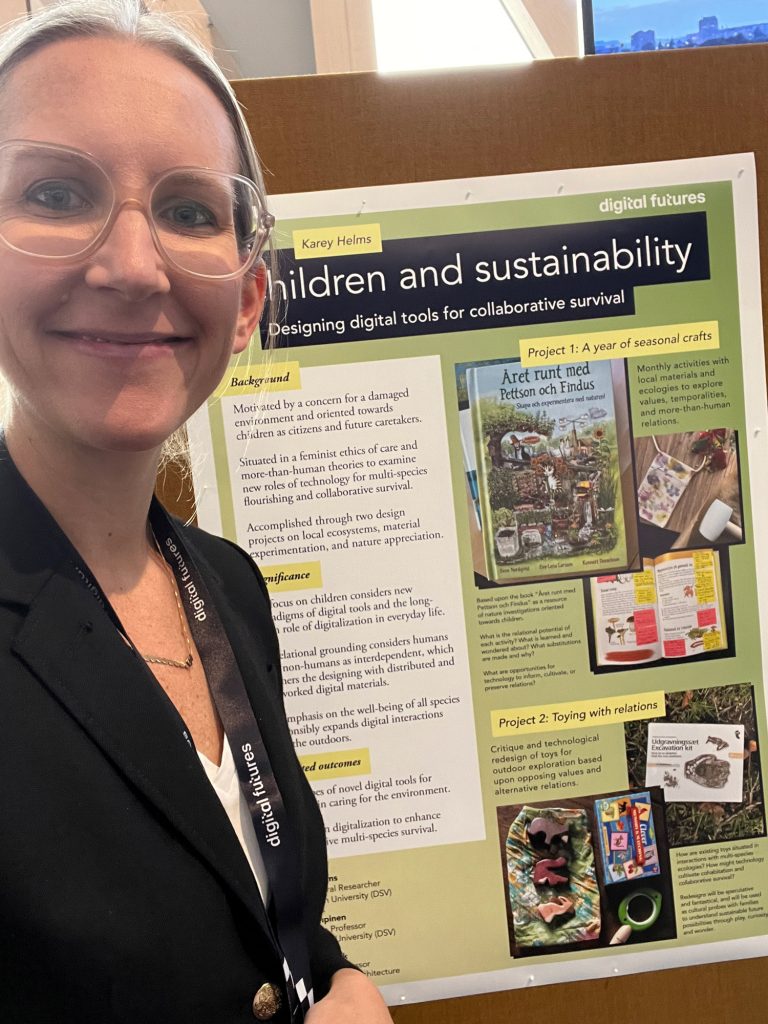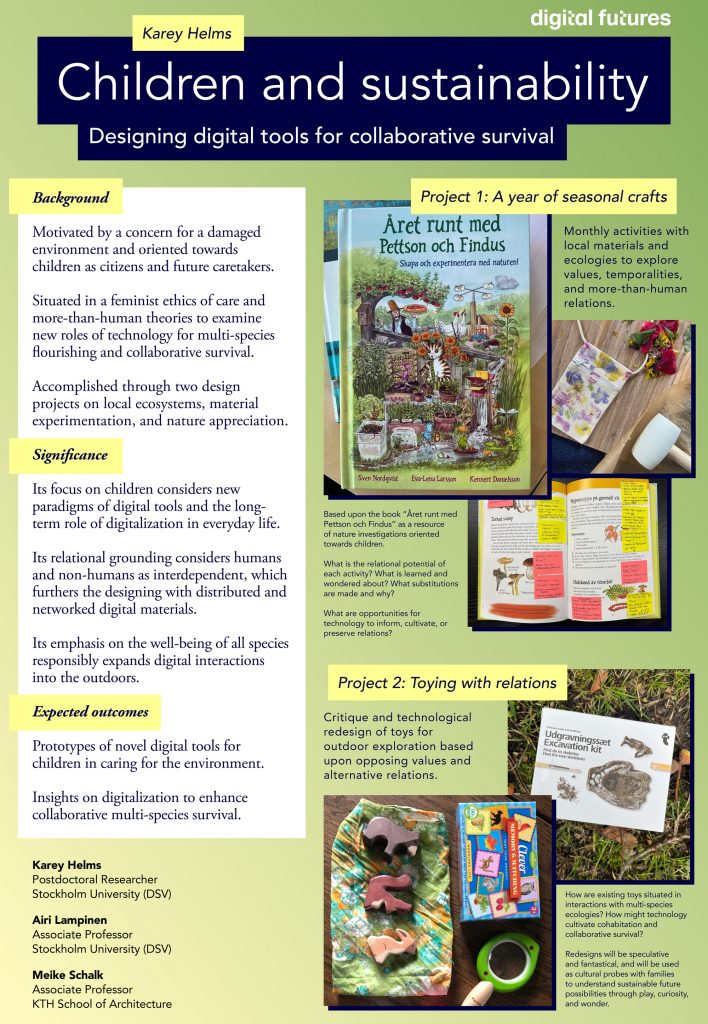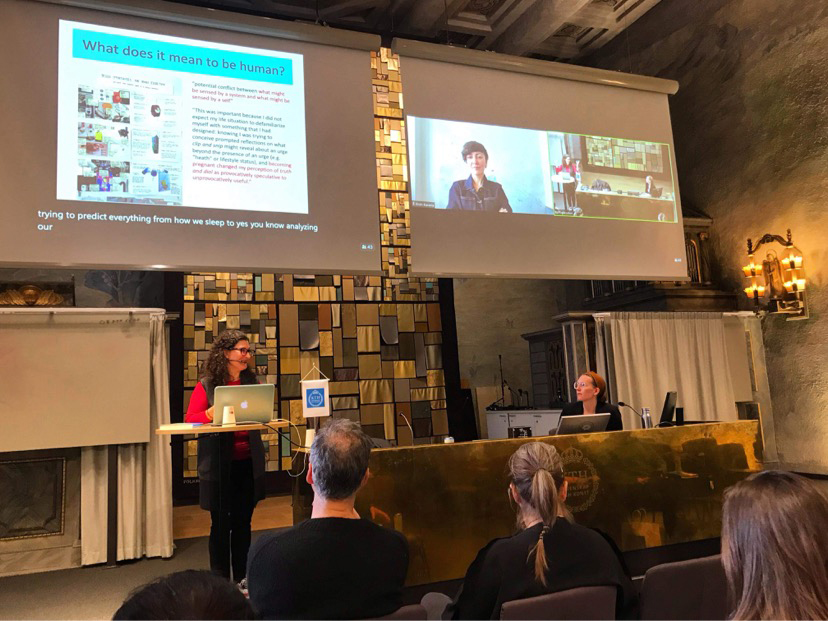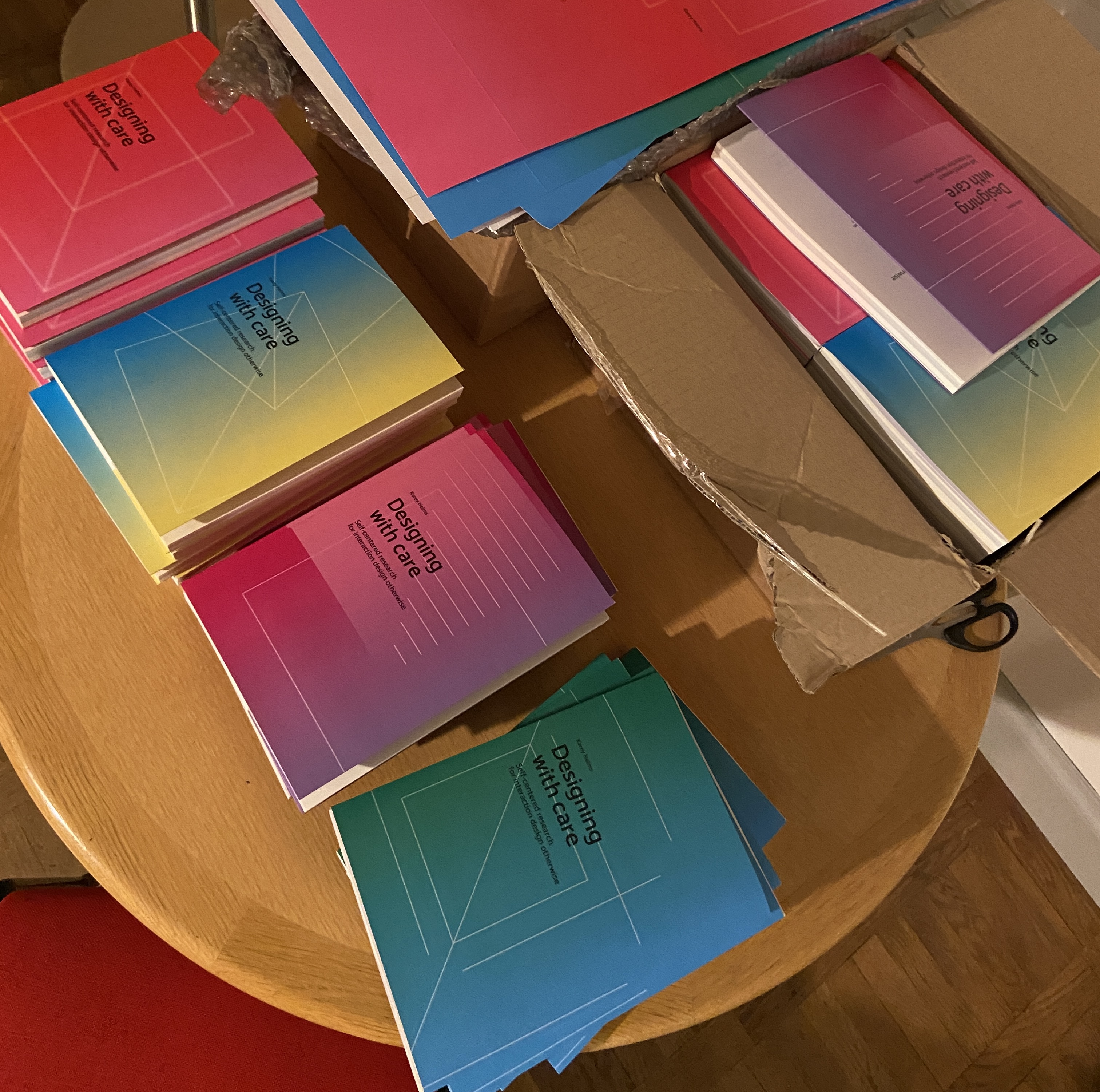Category: more-than-human
Digitalize in Stockholm 2023 – Poster Presentation
Today I gave a poster presentation of my postdoctoral research project at Digitalize in Stockholm 2023. As its only my second month on the new job, the poster is focused on a general overview and two projects I’ve recently begun: Seasonal Craft Implosions (on the poster called A Year of Seasonal Crafts) and Toying with Relations. I had some really lovely conversations regarding taking children (and play) seriously and explorative research methods.


Digital Futures Postdoc Fellowship
Last year I was awarded a digital futures postdoctoral fellow position, which due to parental leave for my second child, I will begin on August 15th, 2023 at Stockholm University. I will be working with Airi Lampinen (Stockholm University) and Meike Schalk (KTH Royal Institute of Technology) on the project Children and sustainability: Designing digital tools for collaborative survival.
About the project
My research will investigate children and digitalization for more sustainable futures. It draws upon a feminist ethics of care and more-than-human theories of collaborative survival to examine new roles of technology in and for multi-species flourishing. This will be done through design-based activities (i.e. research-through-design) that will be situated around topics such as human-waste relations, local ecosystems, and nature appreciation.
Background
This research is motivated by a concern for a damaged environment and is oriented towards children as inhabitants and caretakers of its future. It is significant for the following reasons. Firstly, its focus on children is significant in considering new paradigms of digital tools and the long-term role of digitalization in everyday life. Secondly, its relational grounding within theories of care provides a lens to consider humans as interconnected with non-humans, which is important in developing understandings of designing with distributed and networked digital materials. Thirdly, its emphasis on nature as critical to the health and wellbeing of all species situates an important and often overlooked context for digitalization, which is significant in responsibly expanding digital interactions into the outdoors and nonurban environments.
Dr. Helms
What a privilege on Monday to have my doctoral work presented by Laura Forlano, and deeply engaged with by her and committee Danielle Wilde, Elvin Karana, and Carl DiSalvo (and Martin Avila). Elated, exhausted, overwhelmed, overjoyed, tired, and energized are just a few of the ways I feel. So thankful for the incredible support from everyone near, far, in person, and online. ~ Dr. Helms

PhD defense!
On Feb 6th 13.00, I’ll be taking a brief intermission from parental leave 👶 to defend my thesis “Designing with care: Self-centered research for interaction design otherwise” ✨ Welcome to join: Kollegiesalen, Brinellvägen 8, Stockholm or on Zoom (https://kth-se.zoom.us/j/67699289253). Abstract below and PDF here!
Opponent: Laura Forlano
Committee: Danielle Wilde, Carl DiSalvo (virtual), Elvin Karana (virtual), Martin Avila

Designing with care: Self-centered research for interaction design otherwise
This dissertation is about the research program designing with care as a pathway towards interaction design otherwise amid a world in crisis. Considering how established ways of doing interaction design will change involves recognizing the role of digital materials in social injustice and systemic inequality. These concerns are inseparable from the material complexity of interactive experiences and their more-than-human entanglements in care. Through five design experiments, I explore everyday human care as wickedly attending to some care doings and not others, and an intimate and generous questioning of oneself as human.
I offer four contributions for interaction designers and design researchers. The first contribution is designing with care. This research program draws upon care ethics and posthumanism to establish four axioms: everyday, wickedness, intimacy, and generosity. Within this programmatic framework, the second contribution is definitions of wickedness and generosity as ethical stances that can be taken by designers and researchers. The third contribution is the synthesis of my four methodological approaches: auto-design, spatial orientations, leaky materials, and open speculations. Each is a generative and analytical pathway towards more sustainable and just futures. The fourth contribution is five careful designs as prototypes of what interaction design otherwise might be like: technologies of human waste, spying on loved ones, leaky breastfeeding bodies, scaling bodily fluids, and a speculative ethics.
From my research program and contributions, I discuss disciplinary resistances to suggest three possibilities for how I argue interaction design should change: engaging with mundane yet unrecognized topics, doing design work where the consequences would be present, and reconsidering how the formats of research publications could better reflect positionality. I then reflect upon the relevancy of self-centered research in moving beyond oneself for more sustainable worlds.
CHI 2022 – Publications
A little over a week ago, I had two papers published at the ACM CHI conference and a position paper shared at the workshop Feminist Voices about Ecological Issues in HCI. Check them out!
Karey Helms. 2022. A Speculative Ethics for Designing with Bodily Fluids. ACM Conference on Human Factors in Computing Systems Extended Abstracts (CHI 2022, alt.chi) New Orleans, LA, USA.
PDF, DOI, Video (8 min), Video (30 sec)
Pedro Sanches, Noura Howell, Vasiliki Tsaknaki, Tom Jenkins, and Karey Helms. 2022. Diffraction-in-action: Designerly Explorations of Agential Realism Through Lived Data. ACM Conference on Human Factors in Computing Systems (CHI 2022), New Orleans, LA, USA. (Best Paper Honorable Mention Award)
DOI, Video (8 min), Video (30 sec)
Karey Helms. 2022. Site-writing around Breastfeeding. ACM Conference on Human Factors in Computing Systems (CHI 2022, Position paper) Workshop “Feminist Voices about Ecological Issues in HCI”, New Orleans, LA, USA.